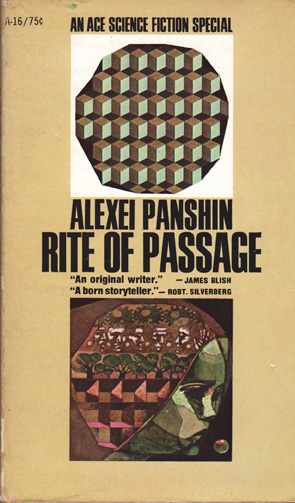Rite of Passage

Undergoing a physical ordeal is only one aspect of her transformation from child to woman; she must also undergo a moral transformation and ends up opposing her father on an issue that effects a world.
As part of her attempts to grapple with morality, she has to prepare a paper for school on the subject. She wrote:
What I find interesting is that she uses the "is-ought" definition for morality. I first read this book in high school, yet I didn't remember this part (cf. here).Ethics is the branch of philosophy that concerns itself with conduct, questions of good and evil, right and wrong--and there are a great many of them, because even people who supposedly belong to the same school don't agree a good share of the time and have to be considered separately--can be looked at as a description and as a prescription. Is this what people actually do? Is this what they should do?
She goes on to critique several ethical systems. First, utilitarianism:
Skipping the development and history of utilitarianism, the most popular expression of the doctrine is "the greatest good for the greatest number," which makes it sound like its relative, the economic philosophy communism which, in a sense, is what we live with in the Ship. The common expression of utilitarian good is "the presence of pleasure and the absence of pain."
Speaking descriptively, utilitarianism doesn't hold true, though the utilitarian claims that it does. People do act self-destrucively at times--they know the pleasureful and chose the painful instead. The only way that what people do and what utilitarianism says they do can be matched is by distorting the ordinary meanings of the words "pleasure" and "pain." Besides, notions of what is pleasurable are subject to training and manipulation. The standard is too shifting to be a good one.
I don't like utilitarianism as a prescription, either. Treating pleasure and pain as quantities by which good can be measured seems very mechanical, and people become just another factor to adjust in the equation. Pragmatically, it makes sense to say One hundred lives saved at the cost of one?--go ahead! The utilitarian would say it every time--he would have to say it. But who gave him the right to say it? What if the one doesn't have any choice in the matter, but is blindly sacrificed for, say, one hundred Mudeaters whose very existence he is unaware of? Say the choice was between Daddy or Jimmy and a hundred Mudeaters. I wouldn't make a utilitarian choice and I don't think I could be easily convinced that the answer should be made by the use of the number of pounds of human flesh. People are not objects.
Next, she questions the philosophy of "might makes right."
In effect, the philosophy of power says that you should do anything you can get away with. If you don't get away with it, you were wrong.
You can't really argue with this, you know. It is a self-contained system, logically consistent. It makes no appeal to outside authority and it doesn't stumble over its own definitions.
But I don't like it. For one thing, it isn't a very discriminating standard. There doesn't seem to be any difference between "ethically good" and "ethically better." More important, however, stoics strap themselves in ethically so that their actions have as few results as possible. The adherents of the philosophy of power simply say that the results of their actions have no importance--the philosophy of a two year old throwing a tantrum.
She summarizes:
My paper was a direct discussion and comparison of half-a-dozen ethical systems, concentrating on what seemed to me to be their flaws. I finished by saying that it struck me that all the ethical systems I was discussing were after the fact. That is, that people act as they are disposed to, but they like to feel afterwards that they were right and so they invent systems that approve of their dispositions. This was to say that while I found things like "So act as to treat humanity, whether in your person or in that of another, in every case as an end and not as a means merely," quite attractive principles, I hadn't run into any system that exactly fitted my disposition.
Of course, she would need to examine whether or not an ethical system should fit one's disposition. When should one cede one's moral authority, if ever? Why?

